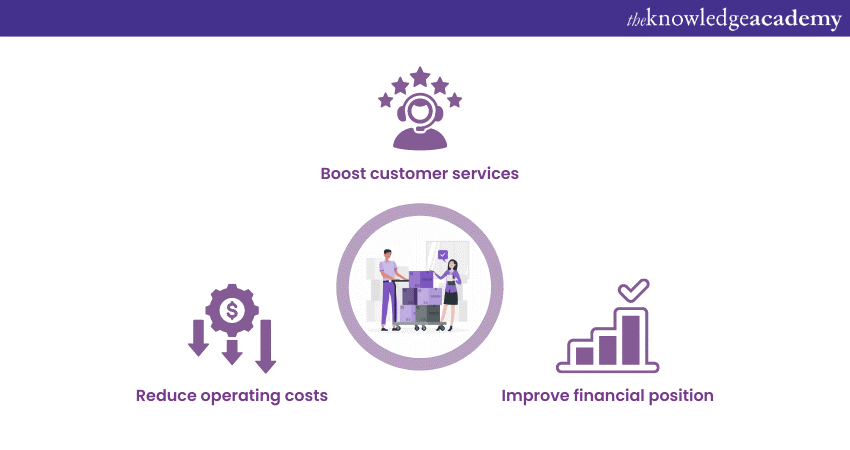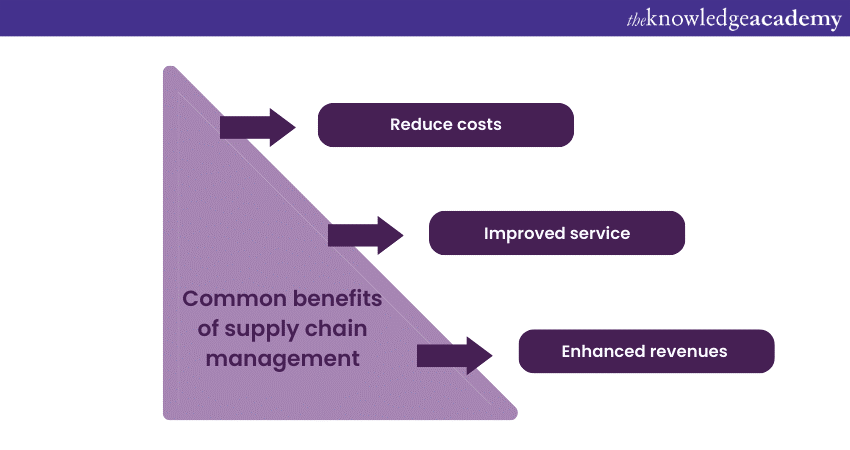We may not have the course you’re looking for. If you enquire or give us a call on 01344203999 and speak to our training experts, we may still be able to help with your training requirements.
Training Outcomes Within Your Budget!
We ensure quality, budget-alignment, and timely delivery by our expert instructors.

The use of Supply Chain Management (SCM) systems by businesses has various benefits. One of the Benefits of Supply Chain Management is its competitive advantage to lower the inherent risks when purchasing new raw materials and selling goods and services.
Although supply chain optimisation is not easy, successful SCM helps reinforce the supply chain. Know the Benefits of Supply Chain Management and examine how it strengthens vendors to complete a delivery process efficiently. Due to the complex nature of the global supply network, data-driven supply management is essential. The monitoring of the flow of information, goods and services from procurement to delivery of goods to the final customer is made possible by data-driven SCM.
Table of Contents
1) What is supply chain?
2) What is Supply Chain Management?
3) Why is Supply Chain Management important?
4) Benefits of Supply Chain Management
5) Conclusion
What is Supply Chain?
An easy understanding of the supply chain is managing the flow of products and raw materials. This procedure involves everything directly connected, from specific employees to the entire business, data and resources.
E-commerce companies are responsible for managing design, production, sourcing, shipping, and delivery. For transportation firms, logistics is of greater importance. Customer satisfaction is still of primary importance, regardless of industry. Usually, the responsibilities and procedures that make up Supply Chain Management involve:
1) Concept: It consists of sourcing and procurement of materials to fulfilment.
2) Industry: It involves trade compliance and transportation
3) Functions: It involves logistics and inventory
To maximise value, Supply Chain Management requires the working of different stakeholders together. The ability to work effectively depends on moving parts, yet fulfilling consumer demands is the primary goal.

What is Supply Chain Management?
Supply Chain Management ensures that goods arrive at the appropriate time and location. This supply and demand integration needs a unique combination of corporate operations, purchasing, accounting, and production.
a) Planning: Organising plans is of utmost importance. Through data analytics, Supply Chain Management software aids in demand forecasting and planning.
b) Sourcing: Choosing suppliers to produce goods or provide services is the first step in any collaborative effort. This phase also includes writing contacts and maintaining connections with vendors and suppliers. An SCM system oversees purchasing, acquiring, management of inventory, and payment authorisation.
c) Production: Technology is essential for production. Design, conceptualisation, materials, quality assurance and packaging, are the components of this phase.
d) Delivering: This phase concerns logistics and the assurance of reaching the goods and services to customers. Every industry deals with different deliverable materials.
e) Returning: Any effective Supply Chain Management consists of a network that constitutes mechanisms for the return of any products that are either defective or unwanted.
An effective supply chain must function in conjunction with its environment. For example, a business must be able to modify production in response to the shortage of materials. In this way, it must also be positioned to react swiftly to avoid delays that may arise due to weather disruptions.
An effective supply chain can assist organisations in avoiding issues like delayed orders, over-production, and lost or damaged products. It must also aid in risk management and damage control in the event of natural catastrophes or other unforeseen circumstances. It would allow businesses to plan in case any aspect of their system is disrupted.
Why is Supply Chain Management important?
Business performance can be improved significantly by using Supply Chain Management. Revenue growth and increased profit margins are correlated. The advantage of Supply Chain Management extends beyond financial gain. Cost, waste, and time can all be reduced drastically using system optimisation.
Let’s examine the basic reasons for understanding the significance of Supply Chain Management:
a) Boost Customer Services: The customer's entire experience is protected by a seamless SCM system. From the time of purchase till delivery, customers prefer simple and easy transactions, and social media provides another option to communicate and foresee issues allowing for an enhanced customer experience.
b) Reduce operating costs: Cost savings can be achieved at any point in the Supply Chain Management process without putting the consumers in danger. Technology saves time while also providing information that helps with decision-making and any improvement to be made in future. Effective sales planning and technology also help reduce production costs, thereby reducing overall operating costs.
c) Improve financial position: Long-term goal is continually invalidated by geopolitical, environmental, and other unforeseen events, which causes a gap between financial and objective supply chain operations. By coordinating financial goals with the SCM system, you can reduce supply chain risks while safeguarding the bottom line. Review every aspect of the SCM system to fix any issues. Reducing the requirements for fixed assets requires effective inventory management.
Want your business to grow? Get started now on Supply Chain Management Training!
Benefits of Supply Chain Management
Data-driven Supply Chain Management offers complete visibility for tracking the flow of information, services, and items from procurement to manufacturing and delivery to the final customer.

Establishing an effective Supply Chain Management (SCM) that offers various benefits and improves the supply chain's foundations is not easy. Here are 10 of the most significant advantages of efficient Supply Chain Management:
1) Improved collaboration: For businesses, information flow presents a significant issue. The absence of an automated flow of data across the supply chain results in a loss of sales. Integrated software solutions enable an easy exchange of information, eliminating bottlenecks and giving a comprehensive view of the supply chain.
2) Better quality control: Companies gain from better quality control when they have more control over not just their direct suppliers but also their supplier’s suppliers. For example, implementing uniform minimum quality standards helps direct providers to find and collaborate with secondary suppliers.
3) Increased efficiency rate: Real-time information on the availability of materials and manufacturing delays enables businesses to create a backup plan. This allows them to procure resources from secondary suppliers, preventing additional delays. Having a plan B results in easy management of resources in the supply chain.
4) Increased revenue generation: Supply Chain Management can be made more efficient by integrating various resources such as labour, materials, and related component, making it advantageous to your company. This will also result in increased revenue generation.
5) Optimisation of logistics distribution: The cost of logistics is significantly rising, impacting micro and small businesses alike. This can be seen in the United Kingdom, India and other countries. Compared to your competitor, you could lower your distribution expenses by using fewer channels of distribution.
6) Reduced inventory and overhead costs: Effective supply chain can decrease the need to maintain an inventory, thereby saving overhead expenses for security and storage. On the other hand, extremely poor inventory can strain distribution systems and make them less resilient to supply chain shocks. With precise demand prediction, companies can reduce overhead expenses. Identification of unnecessary costs is a way to achieve leaner operations. If a company faces higher logistics expenses, switching to another supplier offering similar services can reduce costs.

7) Enhanced risk mitigation: Large-scale and detailed supply chain data analysis can identify potential hazards, allowing businesses to create backup plans to react quickly to unforeseen events. Companies can also adopt proactive methods rather than reacting to any disruptions, quality control matters, or any other similar events as they arise.
8) Strong cash flow: Any disruption in the supply chain has a domino effect that affects every junction throughout the supply chain. However, it is also true with the positives. An efficient SCM directly influences the flow of information, products and related services.
9) Asset utilisation: Utilising assets more efficiently enables businesses to implement effective Supply Chain Management. Owners can evaluate and assess demand rather than update equipment. Organisations can assure availability, minimise quality concerns, expedite product delivery, and easily handle cases of returns.
10) Better visibility and data analytics: Using conferencing systems, shared dashboards, and mobile phone applications, business owners can stay updated and continually communicate with their suppliers. Software technologies can also be used for this. With real-time data analytics, one can create a backup plan.
Conclusion
Effective Supply Chain Management is fuelled by more than just data, including a strong vendor relationship, efficient management of cost, finding the proper logistics partners, and implementing cutting-edge supply chain technologies. Benefits of Supply Chain Management include efficient rates, reduced cost, and enhanced output. A successful SCM must work together with its environment.
Get your Industry Training today and unlock the power in understanding Supply Chain Management.
Frequently Asked Questions
Upcoming Business Skills Resources Batches & Dates
Date
 Supply Chain Management Training
Supply Chain Management Training
Fri 6th Dec 2024
Fri 3rd Jan 2025
Fri 7th Mar 2025
Fri 2nd May 2025
Fri 4th Jul 2025
Fri 5th Sep 2025
Fri 7th Nov 2025







 Top Rated Course
Top Rated Course


 If you wish to make any changes to your course, please
If you wish to make any changes to your course, please


